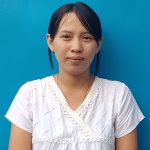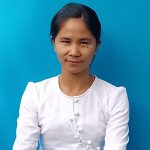Members

Associate Professor
Head of FC

Lecturer

Lecturer

Assistant Lecturer

Assistant Lecturer

Assistant Lecturer

Assistant Lecturer

Assistant Lecturer
Offer Subjects
| Subject Code | Field of Study |
|---|---|
| CST-102 | Mathematics of Computing I |
| CST-202 | Mathematics of Computing II |
| CST-302 | Mathematics of Computing III |
| CST-402 | Mathematics of Computing IV |
| CST-501 | Mathematics of Computing V |
| Paper II | Mathematics of Computing I |
Course Description
CM-121
COURSE DESCRIPTION
| Course code number | CM-121 | Course Title | Discrete Mathematics |
| Semester hours | 3 hours | No. of Credit Units | 3 |
| Prerequisite | None | Course Coordinator | Dr.Thida Aung Daw San San Aye Daw Wine Sandar Aung |
Course Description
An introduction to discrete mathematical concepts including the foundations: logic and
proofs, mathematical induction and recursion, sets, functions, sequences and summations,
matrices, complexity of algorithms, number theory, permutations and combinations, an
introduction to discrete probability and graphs.
Textbook
Discrete mathematics and its applications, 7h Edition, Kenneth H. Rosen. McGraw-Hill
2012.
Course Outcomes
Students who complete the course will be able to
1. Define and precisely use standard mathematical terminology and concepts.
2. Identify and apply appropriate methods of proof.
3. Understand the basic principles of sets and operations in sets and manipulate sets,
relations, functions and their associated concepts, and apply these to solve
problems in mathematics and computer science.
4. Understand the principles of elementary probability theory
5. Understand basic terminology and operations for graphs
6. Use graphs to solve problems in computer science.
Major Topics Covered in the Course
1. Propositional and Predicate Logic
2. Proof Techniques
3. Sets
4. Functions
5. Sequences and Summations
6. Matrices
7. The Growth of Functions and Complexity of Algorithms
8. Number Theory
9. Counting
10. Introduction to Discrete Probability
11. Introduction to Graph Theory
Assessment Plan for the Course
Attendance – 10%
Quizzes – 10%
Assignment – 20%
Test – 10%
Final Exam – 50%
Grading System
UCSY follows a letter grade system comprising of grades A, A-, B+, B, B-, C+,
C, C-, D and F. All marks obtained by students during the semester will be used in the
grading process. A grade of “D” is considered a passing grade for undergraduate courses.
For undergraduate students, a grade of “C” or better is required in this course because it
is a prerequisite for other courses in the program. The student who gets the grade point
less than 2 must do Re-Exam.
The grading scale for this course is:
Marks obtained Letter Grade Grade Point
>=90 A 4
85 – 89 A- 3.75
80 – 84 B+ 3.25
75 – 79 B 3
70 – 74 B- 2.75
65 – 69 C+ 2.25
60 – 64 C 2
55 – 59 C- 1.75
50 – 54 D 1
0 – 49 F 0
Fail Grade and Re-Exam: C-,D,F (Grade point <2)
Class Attendance and Participation Policy:
· Attendance
Class attendance is mandatory. Most of the material you will learn will be covered in
the lectures, so it is important that you not miss any of them. You are expected to show
up on time for class, and stay for the whole lecture. Students are expected to attend each
class, to complete any required preparatory work (including assigned reading) and to
participate actively in lectures, discussions and exercises.
• Mobile phones must be silenced and put away for the entire lecture unless use is
specified by the instructor. You may not make or receive calls on your cell phone, or send
or receive text messages during lectures.
• You are responsible for all material sent as email. Ignorance of such material is no
excuse. You are responsible for all materials presented in the lectures.
• Your conduct in class should be conducive towards a positive learning environment for
your class mates as well as yourself.
· Quizzes, assignments, tests and Exam
Your performance in this class will be evaluated using your scores for attendance,
quizzes, homework assignments, two tests and one final examination. There are no
planned extra credit projects or assignments to improve your grade.
We will take a short quiz for every lecture.
There will be 8 homework assignments, roughly one per week. Please show all
your work and write or type your assignments neatly. Credit cannot be given for answers
without work (except on true-false, always-sometimes-never, or other multiple choice
questions).
Test will start after two or three chapters finished and the coordinator will
announce the date for the test.
Any assignment or quiz or test is simply missed, regardless of the reason why
(e.g. illness, work, traffic, car trouble, computer problems, death, etc.), and earns a
grade of zero. You are strongly encouraged to complete all assignments and attend all
quizzes so that you can check that you understand the material and can throw out bad
grades, or grades for which you had to miss an assignment or quiz for a valid reason.
Late submissions will not be accepted for any graded activity for any reason.
· There are no extra credit opportunities.
Students may not do additional work nor resubmit any graded activity to raise a
final grade.
· Exam
The exam will be conducted on-campus, in a classroom. The dates/times/locations
will be posted on Board as soon as possible.
For this course, the following additional requirements are specified:
All work submitted for a grade must have been prepared by the individual student.
Students are expressly prohibited from sharing any work that has been or will be
submitted for a grade, in progress or completed, for this course in any manner with a
person other than the instructor and teaching assistant(s) assigned to this course).
Specifically, students may not do the following, including but not limited to:
· Discuss questions, example problems, or example work with another person that
leads to a similar solution to work submitted for a grade.
· Give to, show, or receive from another person (intentionally, or accidentally
because the work was not protected) a partial, completed, or graded solution.
· Ask another person about the completion or correctness of an assignment.
· Posting or sharing course content (e.g. instructor provided lecture notes,
assignment directions, assignment questions, or anything not created solely by the
student.
Tentative Lesson
| No | Topics | Week | Remark |
| I | 1 The Foundations: Logic and Proofs | ||
| 1 | 1.1 Propositional Logic Week 1 | Week 1 | Assignment1 |
| 2 | 1.2 Applications of Propositional Logic | ||
| 3 | 1.3 Propositional Equivalences | Week 2 | |
| 4 | 1.4 Predicates and Quantifiers | ||
| 5 | 1.5 Nested Quantifiers | Week 3 | |
| 6 | 1.6 Rules of Inference | ||
| 7 | 1.7 Introduction to Proofs | ||
| II | 2 Basic Structures: Sets, Functions, Sequences, Sums, and Matrices | ||
| 8 | 2.1 Sets | Week 4 | Assignment 2 |
| 9 | 2.2 Set Operations | ||
| 10 | 2.3 Functions | ||
| 11 | 2.4 Sequences and Summations | Week 5 | |
| 12 | 2.6 Matrices | ||
| 13 | 1.8 Proof Methods and Strategy | ||
| III | 3 Algorithms | ||
| 14 | 3.2 The Growth of Functions | Week 6 | Assignment 3 |
| 15 | 3.3 Complexity of Algorithms | ||
| IV | 4 Number Theory | ||
| 16 | 4.1 Divisibility and Modular Arithmetic | Week 7 | Assignment 4 |
| 17 | 4.2 Integer Representations and Algorithms | ||
| 18 | 4.3 Primes and Greatest Common Divisors | ||
| 19 | 4.4 Solving Congruences | ||
| Test I | |||
| V | 5 Induction and Recursion | ||
| 20 | 5.1 Mathematical Induction | Week 8+9 | Assignment 5 |
| 21 | 5.2 Strong Induction and Well-Ordering | ||
| 22 | 5.3 Recursive Definitions and Structural Induction | ||
| VI | 6 Counting | ||
| 23 | 6.1 The Basics of Counting | Week 10 | Assignment 6 |
| 24 | 6.2 The Pigeonhole Principle | ||
| 25 | 6.3 Permutations and Combinations | Week 11 | |
| VII | Discrete Probability | ||
| 26 | 7.1 An Introduction to Discrete Probability | Week 12+13 | |
| 27 | 7.2 Probability Theory | Assignment 7 | |
| 28 | 7.4 Expected Value and Variance | ||
| VIII | 10 Graphs | Assignment 8 | |
| 29 | 10.1 Graphs and Graph Models | Week 14 | |
| 30 | 10.2 Graph Terminology and Special Types of Graphs | ||
| 31 | 10.3 Representing Graphs and Graph Isomorphism | Week 15 | |
| 32 | 10.4 Connectivity | ||
| Test II | |||
| 33 | Revision |
CM-202
COURSE DESCRIPTION
| Course code number | CST-202 | Course Title | Mathematics of Computing II |
| Semester hours | 4 hours | No. of Credit Units | 3 |
| Course Coordinator | Daw New Nwe San |
Course Description
This course covers Laplace Transform, Infinite Sequences and Series, Parameterized
Equations and Polar Coordinates, Vectors and The Geometry of Space.
Textbook
1. Thomas’ Calculus, 12 th Edition, George B, Thomas, Maurice D. Weir, Joel Hass.
2. Advanced Engineering Mathematics, 10th edition, by E.Kreyszig
References
Calculus: Early Transcendental, Eighth Edition by James Stewart.
Course Outcomes
Students who complete this course will be able to
1. Understand solving linear ODEs and related initial value problems, as well as
systems of linear ODEs, much easier using Laplace Transform.
2. Represent a known differentiable function f(x) as an infinite sum of powers of x,
so it looks like a ”polynomial with infinitely many terms.”
3. Understand the geometric definitions and standard equations of parabolas,
ellipses, and hyperbolas (conic sections, or conics).
4. Understand three-dimensional coordinate systems and vectors, the analytic
geometry of space, where they give simple ways to describe lines, planes,
surfaces, and curves in space.
Major Topics Covered in the Course
1. Laplace Transform
2. Infinite Sequences and Series
3. Parameterized Eqs and Polar Coordinates
4. Vectors and The Geometry of Space
Assessment Plan for the Course
Attendance – 10%
Quizzes – 10%
Assignment – 10 %
Test – 10%
Final Exam – 60%
Class Attendance and Participation Policy:
· Attendance
Class attendance is mandatory. Most of the material you will learn will be covered in
the lectures, so it is important that you not miss any of them. You are expected to show
up on time for class, and stay for the whole lecture. Students are expected to attend each
class, to complete any required preparatory work (including assigned reading) and to
participate actively in lectures, discussions and exercises.
• Mobile phones must be silenced and put away for the entire lecture unless use is
specified by the instructor. You may not make or receive calls on your cell phone, or send
or receive text messages during lectures.
• You are responsible for all material sent as email. Ignorance of such material is no
excuse. You are responsible for all materials presented in the lectures.
• Your conduct in class should be conducive towards a positive learning environment for
your class mates as well as yourself.
· Quizzes, assignments, tests and Exam
Your performance in this class will be evaluated using your scores for attendance,
quizzes, homework assignments, two tests and one final examination. There are no
planned extra credit projects or assignments to improve your grade.
We will take a short quiz for every lecture.
There will be 6 homework assignments, roughly one per week. Please show all
your work and write or type your assignments neatly. Credit cannot be given for answers
without work (except on true-false, always-sometimes-never, or other multiple choice
questions).
Test will start after two or three chapters finished and the coordinator will
announce the date for the test.
Any assignment or quiz or test is simply missed, regardless of the reason why
(e.g. illness, work, traffic, car trouble, computer problems, death, etc.), and earns a
grade of zero. You are strongly encouraged to complete all assignments and attend all
quizzes so that you can check that you understand the material and can throw out bad
grades, or grades for which you had to miss an assignment or quiz for a valid reason.
Late submissions will not be accepted for any graded activity for any reason.
· There are no extra credit opportunities.
Students may not do additional work nor resubmit any graded activity to raise a
final grade.
· Exam
The exam will be conducted on-campus, in a classroom. The dates/times/locations
will be posted on Board as soon as possible.
For this course, the following additional requirements are specified:
All work submitted for a grade must have been prepared by the individual student.
Students are expressly prohibited from sharing any work that has been or will be
submitted for a grade, in progress or completed, for this course in any manner with a
person other than the instructor and teaching assistant(s) assigned to this course).
Specifically, students may not do the following, including but not limited to:
· Discuss questions, example problems, or example work with another person that
leads to a similar solution to work submitted for a grade.
· Give to, show, or receive from another person (intentionally, or accidentally
because the work was not protected) a partial, completed, or graded solution.
· Ask another person about the completion or correctness of an assignment.
· Post questions or a partial, completed, or graded solution electronically (e.g. a
Web site).
· All work must be newly created by the individual student for this course. Any
usage of work developed for another course, or for this course in a prior semester,
is strictly prohibited without prior approval from the instructor.
· Posting or sharing course content (e.g. instructor provided lecture notes,
assignment directions, assignment questions, or anything not created solely by the
student), using any non-electronic or electronic medium (e.g. web site, FTP site,
any location where it is accessible to someone other than the individual student,
instructor and/or teaching assistant(s)) constitutes copyright infringement and is
strictly prohibited without prior approval from the instructor.
Tentative Less
| No | Chapter | Week |
| I | Chapter 12 Vectors and The Geometry of Space | |
| 1 | 12.2 Vectors | Week 1+2 |
| 2 | 12.3 Dot Products (Scalar Products) | |
| 3 | 12.4 Cross Products | |
| II | Chapter 6 Laplace Transform | |
| 4 | 6.1 Laplace Transforms, Linearity, First Shifing Theorem (s- Shifting) | Week 3 |
| 5 | 6.2 Transforms of Derivatives and Integrals,ODEs | Week 4 |
| 6 | 6.3 Unit Step function, Second Shifting Theorem | Week 5+6 |
| 7 | 6.5 Convolution | |
| Test 1 | ||
| III | Chapter 10 Infinite Sequences and Series | |
| 8 | 10.1 Sequences | Week 7+8 |
| 9 | 10.2 Infinite Series | |
| 10 | 10.3 the Integral test | |
| 11 | 10.4 Comparison Tests | Week 9 |
| 12 | 10.5 The Ratio and Root tests | |
| 13 | 10.6 Alternating Series, Absolute and Conditional Convergence | Week 10 |
| 14 | 10.7 Power Series | Week 11 |
| 15 | 10.8 Taylor and Maclaurin Series | |
| IV | Chapter11 Parameterized Eqs and Polar Coordinates | |
| 16 | 11. 1 Parametrizations of Plane Curves | Week 12 |
| 17 | 11.2 Calculus with Parametric Curves | |
| 18 | 11.3 Polar Coordinates | Week 13 |
| 19 | 11.5 Area and Lengths in Polar Coordinates | Week 14 |
| 20 | 11.6 Conic Section | Week 15 |
| 21 | 11.7 Conic in Polar Coordinates | |
| Test II | ||
| V | Revision |
CST-302
COURSE DESCRIPTION
| Course code number | CST-302 | Course Title | Mathematics of Computing III |
| Semester hours | 4 hours | No. of Credit Units | 3 |
| Course Coordinator | Daw Kyi Pyar Moe |
Course Description
This course covers matrices, vectors, determinants, linear systems, matrix eigenvalue problems, mathematical software design considerations, rudiments of floating point arithmetic, systems of linear equations, interpolation and data fitting integration and quadrature, linear least squares and regression.
Textbook
Advanced Engineering Mathematics, 10th edition, by E.Kreyszing
Course Outcomes
Students will be able to:
- Know the important characteristics of matrices, concepts of vector spaces and properties of special categories of matrices.
- Know how to use characteristics of a matrix to solve a linear system of equation or study properties of a linear transformation.
- Acquire a working knowledge of algorithms for approximation solutions of scientific computing problems.
Major Topic Covered in the Course
- Matrices, Vectors, Determinants Linear Systems
- Matrices Eigen Value Problems
- Solution of Equations by Iteration
- Interpolation
- Numeric Integration and Differentiation
Assessment
Plan for the Course
Attendance – 10%
Quizzes – 10%
Assignment – 10%
Test – 10%
Final Exam – 60%
Class attendance and Participation Policy:
- Attendance
Class attendance is mandatory. Most of the material you will learn will be covered in the lectures, so it is important that you not miss any of them. You are expected to show up on time for class, and stay for whole lecture. Students are expected to attend each class, to complete any required preparatory work (including assigned reading) and to participate actively in lectures, discussions and exercises.
- Mobile phones must be silenced and put away for the entire lecture unless use is specified by the instructor. You must be silenced and put away for the entire lecture unless use is specified by the instructor. You may not make or receive calls on sour cell phones, or send or receive text message during lectures.
- You are responsible for all material sent as email. Ignorance of such material is no excuse. You are responsible for all materials presented in the lectures.
- Yours conduct in class should be conducive towards a positive learning environment for your class mates as well as yourself.
- Quizzes, assignments, tests and Exam
Your performance in this class will be evaluated using your sources for attendance, quizzes, homework assignments, two tests and one final examination. There are no planned extra credit projects or assignments to improve your grade.
We will take a short quiz for every lecture.
There will be 3 homework assignments, roughly one per week. Please show all your work and wire or type your assignment neatly. Credit cannot be given for answers without work (except on true-false, always-sometimes-never, or other multiple choice questions).
Test will start after two or three chapters finished and the coordinator will announce the date for the test.
Any assignment or quiz or test is simply missed, regardless of the reason why (e.g. illness, work, traffic, car trouble, computer problems, deaths, etc.), and earns a grade of zero. You are strongly encouraged to complete all assignments and attend all quizzes so that you can check that you understand the material and can throw out bad grades, or grades for which you had to miss an assignment or quiz for a valid reason. Late submissions will not be accepted for any graded activity for any reason.
- There are no extra credit opportunities.
Students may not do additional work nor resubmit any graded activity to raise a final grade.
- Exam
The exam will be conducted on-campus, in a classroom. The dates/times/locations will be posted on Board as soon as possible.
For this course, the following additional requirements are specified:
All work submitted for a grade must have been prepared by the individual student. Students are expressly prohibited from sharing any work that has been or will be submitted for a grade, in progress or completed, for this course in any manner with a person other than the instructor and teaching assistant(s) assigned to this course. Specifically, students may not do the following, including but not limited to:
- Discuss questions, example problems, or example work with another person that leads to a similar solution to work submitted for a grade.
- Give to, show, or receive from another person (intentionally, or accidentally because the work was not protected) a partial, completed or graded solution.
- Ask another person about the completed, or graded solution electronically (e.g. a Web site).
- All work must be newly created by the individual student for this course. Any usage of work developed for another course, or for this course in a prior semester, is strictly prohibited without prior approval from the instructor.
- Posting or sharing course content (e.g. instructor provided lecture notes, assignment directions, assignment questions, or anything not created solely by the student), using any non-electronic or electronic medium (e.g. web site, FTP site, any location where it is accessible to someone other than the individual student, instructor and/or teaching assistant(s)) constitutes copyright infringement and strictly prohibited without prior approval from the instructor.
Tentative Lesson
| No | Topics | Week | Remark |
| I | Chapter 7Linear Algebra: Matrices, Vectors, Determinants. Linear Systems | ||
| 1 | 7.1 Matrices, Vectors: Addition and Scalar Multiplication | Week 1 | |
| 2 | 7.2 Matrices Multiplication | ||
| 3 | 7.3 Linear Systems of Equations. Gauss Elimination | Week 2 | |
| 4 | 7.4 Linear Independent. Rank of a Matrix. Vector Space | Week 3 | |
| 5 | 7.6 For Reference : Second- and Third-Order Determinants | Week 4 | |
| 6 | 7.7 Determinants. Cramer’s Rule | ||
| 7 | 7.8 Inverse of a Matrix. Gauss-Jordan Elimination | Week 5 | |
| II | Chapter 8 Linear Algebra: Matrices Eigen Value Problems | ||
| 8 | 8.1 The Matrix Eigenvalue Problem. Determining Eigenvalues and Eigenvectors | Week 6 | |
| 9 | 8.3 Symmetric, Skew-Symmetric and Orthogonal Matrices | Week 7 | |
| Test I | |||
| III | Chapter 19 Numerics in General | ||
| 10 | 19.1 Introduction | Week 8 | |
| 11 | 19.2 Solution of Equations by Iteration | ||
| 12 | 19.3 Interpolation | Week 9 | |
| 13 | 19.5 Numeric Integration and Differentiation | Week 10 | |
| IV | Chapter 20 Numeric Linear Algebra | ||
| 14 | 20.2 Linear Systems: LU-Factorization, Matrix Inversion | Week 11 | |
| 15 | 20.3 Linear Systems: Solution by Iteration | Week 12+13 | |
| 16 | 20.4 Linear Systems: Ill-Conditioning, Norms | ||
| 17 | 20.5 Least Squares Method | Week 14 | |
| 18 | 20.6 Matrix Eigenvalue Problems: Introduction | ||
| 19 | 20.7 Inclusion of Matrix Eigenvalues | ||
| 20 | 20.8 Power Method for Eigenvalues | Week 15 | |
| Test II | |||
| Revision |
CST-402
COURSE DESCRIPTION
| Course code number | CST-402 Second Semester | Course Title | Mathematics of Computing IV |
| Semester hours | 4 hours | No.of Credit Units | 3 |
| Course Coordinator | Daw Myo Su Su Hlaing& Daw Mi Mi Hnin |
Course Description
| CST-402. Mathematics of Computing IV This course covers Applications of Recurrence Relations, Solving Linear Recurrence Relations, Generating Functions, Modeling Computation: Languages and Grammars, Finite-State Machines with Output, Finite-State Machines with No Output, Language Recognition and Turing Machines. |
Textbook
| Discrete Mathematics and its Applications (Seventh Edition) by KENNETH H. ROSEN |
.
Course Outcomes
| After completing the course, the student will be able to: 1. Model, compare and analyse different computational models using combinatorial methods. 2. Apply rigorously formal mathematical methods to prove properties of languages, grammars and automata. 3. Construct algorithms for different problems and argue formally about correctness on different restricted machine models of computation. 4. Identify limitations of some computational models and possible methods of proving them. |
University of Computer Studies (Dawei)
B.C.Sc./B.C.Tech (Fourth Year)
Major Topics Covered in the Course
| 1. Modeling With Recurrence Relations, Solving Linear Homogeneous and Nonhomogeneous Recurrence Relations, Counting Problems and Generating Functions 2. Phrase Structure Grammars, Derivation Trees, Backus-Naur Form, Finite State Machines with output and no output. 3. Deterministic and Nondeterministic Finite State 4. Using Turing Machines to Recognize Sets |
Assessment Plan for the Course
Attendance – 10%
Quizzes – 10%
Assignment – 10%
Test – 10%
Final Exam – 60%
Class Attendance and Participation Policy
- Attendance
Class attendance is mandatory. Most of the material you will learn will be covered in the
lectures, so it is important that you not miss any of them. You are expected to show up on time for
class, and stay for the whole lecture. Students are expected to attended each class, to complete any
required preparatory work (including assigned reading) and to participate actively in lectures,
discussions and exercises.
- Mobile phones must be silenced and put away for the entire lecture unless use is specified by
the instructor. You may not make or receive calls on your cell phone, or send or receive text messages during lectures.
- You are responsible for all materials send as email. Ignorance of such material is no excuse.
You are responsible for all materials presented in the lectures.
- Your conduct in class should be conducive towards a positive learning environment for your
Class mates as well as yourself.
- Quizzes, assignments, tests and Exam
Your performance in this class will be evaluated using your scores for attendance, quizzes,
homework assignments, two tests and one final examination. There are no planned extra credit
projects or assignments to improve your grade.
There will be 6 homework assignments, roughly one per week. Please show all your work and
write or type your assignments neatly. Credit cannot be given for answers without work (except on
true-false, always-sometimes-never, or other multiple choice questions).
University of Computer Studies (Dawei)
B.C.Sc./B.C.Tech (Fourth Year)
Test will start after one or two chapters finished and the coordinator will announce the date for the test.
Any assignment or quiz or test is simply missed, regardless of the reason why (e.g. illness, work, traffic, car trouble, computer problems, death etc.), and earns a grade of zero. You are strongly encouraged to complete all assignments and attend all quizzes so that you can check that you understand the material and can throw out bad grades, or grades for which you had to miss an assignment or quiz for a valid reason.
Late submissions will not be accepted for any graded activity for any reason.
- There are no extra credit opportunities.
Students may not do additional work nor resubmit any graded activity to raise a final grade.
- Exam
The exam will conducted on-campus, in a classroom. The dates/times/locations will be posted
on Board as soon as possible.
For this course, the following additional requirements are specified:
All work submitted for a grade must have been prepared by the individual student. Students are expressly prohibited from sharing any work that has been or will be submitted for a grade, in progress or completed, for this course in any manner with a person other than the instructor and teaching assistant(s) assigned to this course. Specifically, students may not the following, including but not limited to:
- Discuss questions, example problems, or example work with another person that leads to a similar solution to work submitted for a grade.
- Give to, show, or receive from another person (intentionally, or accidentally because the work was not protected) a partial, completed, or graded solution.
- Ask another person about the completion or correctness of an assignment.
- Post questions or a partial, completed, or graded solution electronically (e.g. a Web site).
- All work must be newly created by the individual student for this course. Any usage of work developed for another course, or for this course in a prior semester, is strictly prohibited without prior approval from the instructor.
- Posting o sharing course content (e.g. instructor provide lecture notes, assignment directions, assignment questions, or anything not created solely by the student), using any non-electronic or electronic medium (e.g. web site, FTP site, any location where it is accessible to someone other than the individual student, instructor and/or teaching assistant(s)) constitutes copyright infringement and is strictly prohibited without prior approval from the instructor.
University of Computer Studies (Dawei)
B.C.Sc./B.C.Tech (Fourth Year)
Tentative Lesson
| No. | Topics | Week | Remark |
| I | Chapter 8 Advanced Counting Techniques | ||
| 1 | 8.1 Applications of Recurrence Relations Introduction; Modeling With Recurrence Relations | Week 1-2 | Assignment 1 |
| 2 | 8.2 Solving Linear Recurrence Relations Introduction; Solving Linear Homogeneous Recurrence Relations with Constant Coefficients Linear Nonhomogeneous Recurrence Relations with Constant Coefficients | Week 3-4-5 | Assignment 2 |
| 3 | 8.4 Generating Functions Introduction; Useful Facts About Power Series Counting Problems and Generating Functions Using Generating Functions to Solve Recurrence Relations Proving Identities via Generating Functions | Week 6-7 | Assignment 3 |
| 4 | Test I | ||
| II | Chapter 13 Modeling Computation | ||
| 5 | 13.1 Languages and Grammars Week 8 Introduction; Phrase-Structure Grammars Types of Phrase-Structure Grammars Derivation Trees Backus–Naur Form | Week 8-9 | Assignment 4 |
| 6 | 13.2 Finite-State Machines with Output Introduction; Finite-State Machines with Outputs | Week 10+11 | |
| 7 | 13.3 Finite-State Machines with No Output Introduction; Set of Strings Finite-State Automata Language Recognition by Finite-State Machines Nondeterministic Finite-State Automata | Week 12+13 | Assignment 5 |
| No | Topics | Week | Remark |
| 8 | 13.4 Language Recognition Introduction; Kleene’s Theorem Regular Sets and Regular Grammars A Set Not Recognized by a Finite-State Automaton More Powerful Types of Machines | Week 14 | Assignment 6 |
| 9 | 13.5 Turing Machines Introduction; Definition of Turing Machines Using Turing Machines to Recognize Sets Computing Functions with Turing Machines Different Types of Turing Machines The Church–Turing Thesis Computational Complexity, Computability, and Decidability | Week 15 | |
| 10 | Test II | Test II | |
| 11 | Revision |